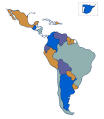China ready to occupy US vacuum in Latin America
Chinese leader Hu Jintao promised to invest up to $ 100 billions in ten years in the region
Stuck in Middle East, US President George W. Bush turned a blind eye to Latin America, where a new left-leaning leadership replaced the pro-US administrations of the nineties. China, as an emerging superpower, considers the region a strategic partner available to supply its industries and huge population with the badly needed natural resources, ranging from oil to soybean.
With the above in mind, Chinese President Hu Jintao started a tour around key South American nations as Brazil, Argentina and Chile, this week, where made known the intentions of the Communist leadership to boost trade partnership. In Brazil, Hu Jintao said China would invest up to $ 100 billions in Latin America, in ten years.
The announcement had been preceded with any sort of speculations about the level of partnership between economies, as many Brazilian and Argentinean industrials raised their concerns over an invasion of Chinese products. In Argentina, for instance, local media outlets speculated with mega infrastructure projects, as textile industrials warned on the closing of factories and subsequent raising of unemployment.
In Brazil, as promoting common prosperity is at the core of the Sino-Brazilian strategic partnership, Chinese President Hu Jintao proposed facilitating trade and investment to better serve entrepreneurs. Speaking at an economic and trade seminar in the Brazilian capital Friday night, Hu said the two highly complementary economies should work towards a win-win scenario.
However, Brazil had to acknowledge China as a market economy, something that prevents it from denouncing Beijing on dumping procedures at the WTO. Urged to sign benefiting trade cooperation deals, Argentina is ready to do the same.
As for Brazil, China has become Brazil's third largest export market. Imports from Brazil approached US$6 billion last year, and hit a new high of US$6.6 billion through September, according to customs statistics. China has founded 70 firms in Brazil, and Brazil has invested in more than 300 projects in China.
As first soybean market for Argentina, China has become one of the main destinies of the exports coming out from the land of Tango. Tourism partnership is an area Buenos Aires is also trying hard to develop.
In an area thirsty of fresh money, the China dream grows bigger and bigger. As the US eagle fails to provide with a promising future, the Chinese dragon is seen by many as a substitute hegemonic power for Latin America, a region that despite recent efforts cannot find its own way.
Subscribe to Pravda.Ru Telegram channel, Facebook, RSS!




